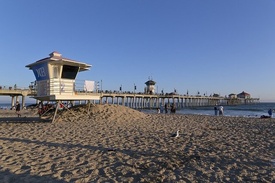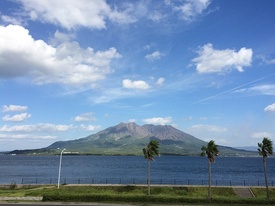Obtaining permanent residency for the future of children
As I listened to the stories of Shin-Issei who returned to Japan after living in the United States for various reasons, or chose to remain in the United States, I also wanted to hear the stories of those who returned to the United States after returning to Japan. At that time, I remembered Tokudome Kinue, whom I met by chance at a seminar held in Irvine, Orange County in the summer of 2019. Tokudome is an activist (I thought she was a journalist, but she asked me to introduce her as an activist) known for her books focusing on the relationship between Jews and Japanese people, and when we met, she told me, "I had returned to Japan once, but I came back to the United States again." More than a year after our reunion, amid the COVID-19 pandemic, I had the opportunity to ask Tokudome over Zoom about her decision to return to Japan, and the circumstances that led to her obtaining permanent residency and re-immigrating.Tokutome first went to America in 1978 to accompany her husband who was posted there. Their two children were still young at the time and attended a Saturday Japanese language supplementary school, but they thought that "if their children returned to Japan, they would have a hard time with the language and lifestyle," so Tokutome and his wife obtained permanent residency so that they would have the option of remaining in America when they received the order to return home. Tokutome continued to be active after that, writing books about the Holocaust and American prisoners of war, while her husband left his company and started his own business. Then, after their children left the United States to become working adults, a turning point came. In 2009, her husband was diagnosed with cancer, and they decided to return to Japan together, choosing to receive treatment in Japan.
"Until my husband got sick, I hadn't really thought much about living in Japan in my old age. But when he got sick for the first time and was diagnosed by a specialist referred by our family doctor in the U.S., we realized that even if insurance covered the first stage of treatment, it might not be so easy to get coverage for the next stage, and we had to worry about medical expenses." The husband's older brother, who lives in their hometown, enthusiastically recommended that the couple "get treatment in Kagoshima," which gave them the push they needed.
He was warmly welcomed in his hometown.
After returning to Japan in May 2009 and undergoing surgery, Tokutome and his wife were able to attend their eldest daughter's wedding in America in July. For the next five years, Tokutome and his wife have lived peacefully surrounded by their family, relatives, and friends in Kagoshima. When asked if life in a rural area of Japan, after 31 years in America, was difficult, Tokutome prefaced his response by saying, "I'm not trying to say nice things," and continued:
"Because our purpose in returning home was for treatment, the people back home treated us warmly, saying it must have been tough, and at least we didn't have any difficulties with interpersonal relationships. I was very grateful that they accepted us. We would talk about America if asked, but we never told them what it was like in America, and there was no need for us to do so. Also, I had returned to Kagoshima and my hometown of Sendai many times from America with our children to show them our family. So it wasn't like I had suddenly come back after 31 years."
Eventually, Tokutome began working at a facility for disabled children that her husband's father had opened. But in 2014, another turning point came.
"My husband passed away. People in Kagoshima told me that I could live here even after I became a widow, and that they wanted me to continue working at the facility. But I decided to live with my father, who was over 90 and living alone in Sendai. Two years later, with the help of my older brother, who also lives in Sendai, my father was admitted to a comfortable nursing home. After the third anniversary of my husband's death, I also decided to return to the United States, and around the summer of 2016, when I became eligible for American Medicare, my daughter, who had gotten married and was living in Irvine, strongly encouraged me to return."
Since he had given up his permanent residency when he returned to Japan, he reapplied for it with his daughter as his sponsor, and returned to the U.S. one summer later. Today, Tokutome lives a lively life surrounded by his daughter, her husband, and two grandchildren.
Activities to benefit Japan
We asked Tokutome how he felt about returning to America after eight years. "It didn't feel like I was far away. I'm living with my daughter's family, so I think I'm blessed in many ways. I was always in contact with my American friends by e-mail while I was in Japan, so they were happy to see me back and we quickly resumed our old friendships, so I didn't feel like I had been away for a while."
When asked whether it is easier to pursue writing in America or Japan, she answered, "I think it depends on the topic you want to write about. In my case, I lived in the US and wrote a collection of interviews about the Holocaust and the issues of American soldiers who were held prisoner by the former Japanese army, both of which are topics that are not well understood in Japan. And the people I interviewed were also in the US, so (returning to the US) was convenient. Right now I'm translating into Japanese the memoirs of the founder of one of the world's leading facilities for disabled children in Jerusalem. In these times, I think you can do writing work no matter where you live."
Tokutome has returned to America, where he lives with his daughter's family and where he has an ideal environment to pursue his life's work, but does he ever miss Japan? "I think I might feel that way when I get older and can no longer physically return home. But I've been living in the US since my mid-20s, and my children are here, so I don't think I'll ever want to go back. I think it would be more painful for me to get older and no longer be able to visit the US, and to be unable to see my children and grandchildren. In order to maintain my connection with Japan, I want to continue writing things that I can publish in Japan and getting involved in activities that I think will benefit Japan, even if it's just a small thing."
This interview reminded me that what's important is not where you live, but who you want to spend time with and what attitude you have towards what you do.
*Website run by Kinue Tokudome: " Jews and Japan "
© 2020 Keiko FUkuda








